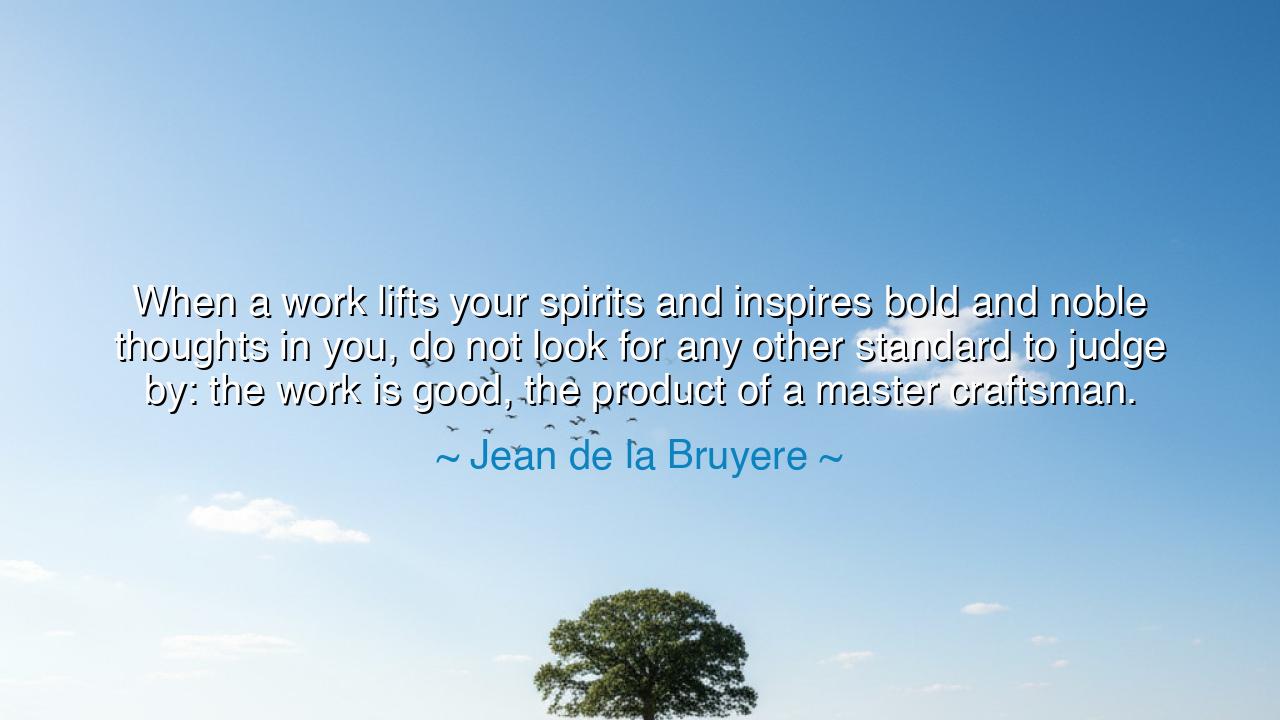
When a work lifts your spirits and inspires bold and noble
When a work lifts your spirits and inspires bold and noble thoughts in you, do not look for any other standard to judge by: the work is good, the product of a master craftsman.






Hearken, O seekers of beauty and discernment, to the words of Jean de la Bruyere, the chronicler of human excellence: "When a work lifts your spirits and inspires bold and noble thoughts in you, do not look for any other standard to judge by: the work is good, the product of a master craftsman." In this utterance lies the ancient truth that the measure of a creation is not merely in its form, but in the power it has to elevate the soul and stir the noblest thoughts within.
In the theater of artistry, many seek rigid rules or precise formulas to evaluate the worth of a work, yet Bruyere reminds us that the spirit is the truest gauge. A work that awakens courage, inspires virtue, or ignites imagination speaks across time and circumstance, declaring its own merit. The mastery of the craftsman is revealed not solely in technique, but in the profound effect the work has on those who encounter it.
The ancients, who revered artisans and philosophers alike, understood this principle well. Beauty and power in creation are inseparable from the capacity to transform the heart and mind. A sculpture, a poem, a melody—if it elevates the spirit and sparks thoughts of nobility and daring, it is beyond mere judgment of form; it carries the seal of a master, whose hands and mind were united in purpose and vision.
Yet this teaching carries a subtle admonition: seek not the fleeting praise of conformity or the shallow approval of rules alone. True excellence is revealed in resonance with the soul. When a work awakens courage, lifts despair, or sparks contemplation, it is already an enduring testament to skill and vision, a beacon of mastery whose light cannot be dimmed by trivial critiques.
Therefore, O children of discernment, let this teaching lodge within your hearts: judge creation by its power to inspire, uplift, and awaken bold thought. In such works, the spirit of the craftsman shines forth, and the enduring value of the labor is revealed. For it is the ability to touch the soul, to provoke nobility and courage, that marks the hand of a true master, whose art transcends time and echoes through the ages.






PNHa phuong Nga
It’s interesting to think about art in this way. But can something that inspires us really be called a 'masterpiece' if it lacks technical or intellectual depth? Shouldn't there be more to judging quality than just emotional impact? I suppose it depends on what we value more—emotional connection or intellectual merit. This quote seems to suggest we shouldn’t overthink, but I’m not sure that’s always the best approach.
QAquynh anh
This quote really makes me reflect on how I judge art and work in general. How often do we let our emotions cloud our judgment of quality? On the other hand, isn’t it true that if something resonates with you deeply, it might be a reflection of its inherent value? The more I think about it, the more I realize that maybe emotion should be considered an important part of evaluating any work.
TKThanh Khiet
I understand the sentiment, but doesn’t it seem a little too simple? A work can make us feel good but still lack depth or skill. How do we decide if the work is truly the product of a master craftsman, or if we’re just swayed by how it makes us feel? Maybe there’s a risk of misjudging something because we’re caught up in the moment.
TKtrung kiet
This quote brings to mind the subjective nature of art and creativity. If something stirs our emotions, does that automatically mean it’s a masterpiece? But, isn’t there a danger in only judging based on personal feelings? I think a work should have a balance of emotional impact and technical mastery. It’s intriguing, but I still believe we should be open to other factors like innovation or skill.
N9Le Tran Thao Nguyen 9/4
I love this idea, but I wonder if it’s always true. Can something that lifts our spirits truly be considered 'good' without any other standard? What if we’re emotionally moved by something that’s not technically well-crafted? For instance, a movie might inspire us, but does that mean it's a masterpiece? It makes me question whether emotions alone are enough to define quality.